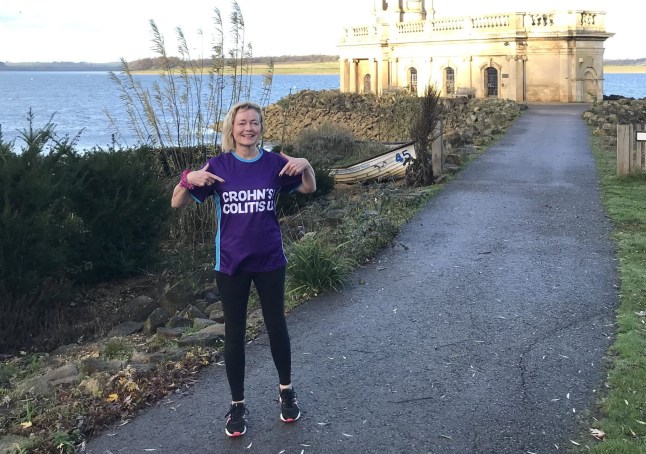
As the crowd gathered at my local parkrun early one Saturday morning, I noticed a young woman making her way across the grass towards me.
‘I saw your T-shirt,’ she said, pointing at the Crohn’s & Colitis UK logo emblazoned across my chest. ‘I have Crohn’s. I’ve been up since 4am with a flare up, but nothing could stop me from coming here today.’
Impressed by her candour, I replied: ‘I just spent an hour trying to leave the house. But we made it!’
By the time we took our positions at the start line, we had shared diagnosis stories. Then the countdown began.
‘See you at the end for a selfie?’ she asked, as she disappeared into the throng. I put my thumbs up and my head into running mode.
Despite living with ulcerative colitis – a long-term inflammatory bowel disease (IBD) – I’m a regular at Rutland Water parkrun in the Midlands. It’s helped me find an inner strength to cope with a debilitating and sometimes painful condition, which can be managed but never cured.
I was 25 when I first noticed traces of blood after using the loo. I initially thought I had a stomach bug, but I went to my GP just to double check.
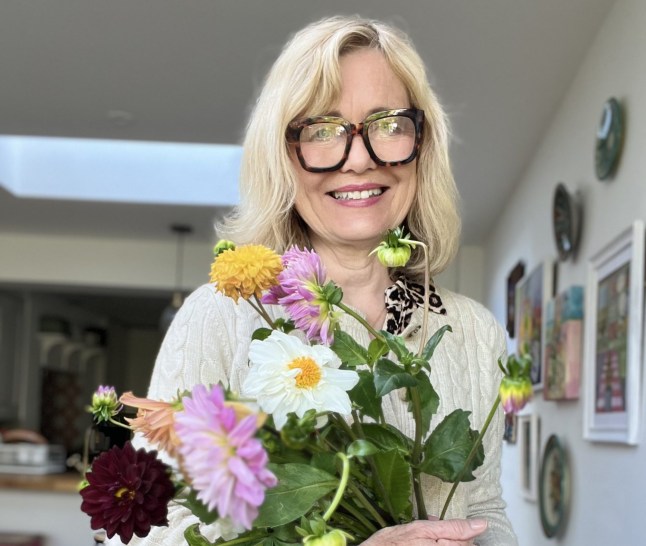
That’s when my doctor fast-tracked me to a gastroenterology clinic at a big London hospital. After a grim shopping list of bowel tests – barium enema, sigmoidoscopy, and eventually, a colonoscopy (which thankfully takes place under sedation) – my diagnosis was confirmed in 1987.
The doctor explained that ulcerative colitis starts when the body’s immune system goes into overdrive, attacking the bowel lining, causing internal inflammation, swelling and tiny ulcers.
One in 10 people with colitis may need major surgery within 10 years of their diagnosis, while others experience periods of good health between episodes.
I walked out of the hospital in a daze. Sure enough, I have experienced severe flare ups ever since, involving urgent diarrhoea, bleeding, and fatigue.
Symptoms of ulcerative colitis
- Frequent diarrhoea, with possible blood, mucus or pus
- Needing to poo often
- Tummy pain
- Other symptoms include fatigue, weight loss and lack of appetite
I had some particularly difficult times in my late twenties, thirties and forties, when the symptoms were barely managed. It felt like having a never ending stomach bug, and the birth of each of my two children triggered massive flare-ups.
When my first son was just six weeks old, my symptoms spiralled and I was hospitalised for steroid therapy to calm the inflammation. Being suddenly parted from my new baby was heartbreaking.
I’ve tried various treatments for the condition over the years. Maintenance drugs control mild inflammation, but for more serious cases like mine, an immunosuppressant can be prescribed.
It was about 25 years ago when I tried it, to dampen down my immune system, and prevent it from getting out of control and effectively attacking your own body.
When that combination failed, I took short courses of oral steroids to try to calm the internal inflammation, which made my face swell like a full moon.
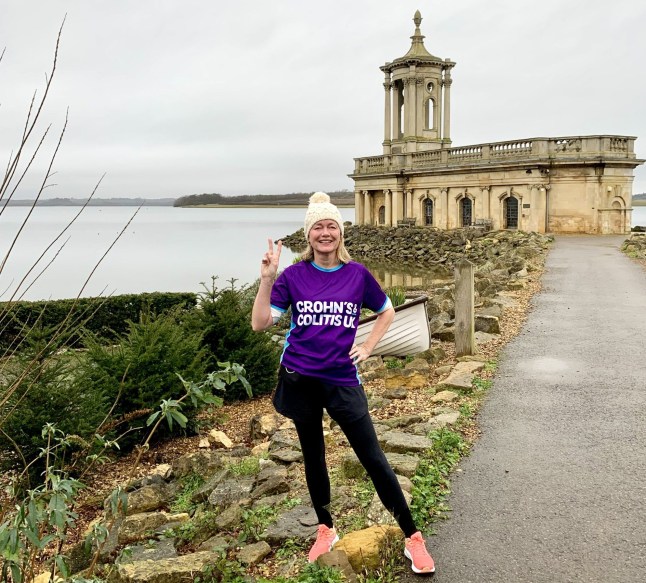
In September 2011 – aged 48 – I felt the tell-tale flicker of pain in my abdomen. I rested and modified my diet to include low fibre foods, which sometimes eases symptoms. But there was no stopping this one.
Within a few weeks, I was admitted to hospital and pumped with huge doses of intravenous steroids via a drip. After five days with no improvement, the consultant said that if there was no change overnight, I must see a surgeon.
I immediately knew what that meant. The only real cure for uncontrolled ulcerative colitis is to remove the colon, replacing it with a stoma (an opening in the abdomen) and colostomy bag.
In certain circumstances, it’s the only choice but I just wasn’t ready for such a big step. That night – awake and wired on steroids – I willed my body to fight back by reciting all the positive affirmations that I could remember.
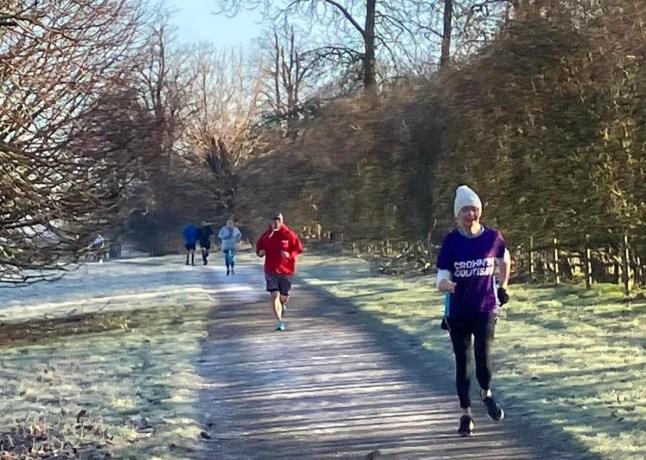
Incredibly, by morning, there was a slight improvement. So five days later, I was home. But it had been such a traumatic experience – both physically and mentally – that I desperately needed to do something to gain a sense of control.
Scouring Google, I found scientific studies showing that people with Crohn’s – another chronic inflammatory bowel disease – or colitis like me who exercise regularly can experience fewer flare ups. Improved blood flow may reduce inflammation, and post-exercise endorphins help the anxiety and depression associated with the disease.
Pilates is recommended, so I signed up for a weekly class. I took to it instantly, loving the combination of deep, slow breathing and stretches, which made me feel in control of my body at last. So I signed up for another. And another.
Alongside that, I’d always enjoyed walking and one day when I was on a routine stroll around the village where I was living, I felt so energetic that I broke into a run. I was trotting along at my own pace and I felt good – but even better, my symptoms were at bay.
Join the country's biggest running club (even if you're a walker)
Joining parkrun is free - it doesn't matter if you're a keen runner, a jogger, a walker, a social stroller or are keen to volunteer and cheer from the sidelines.
Did we mention it's free (tick) and you only need to do it once (tick tick).
After six weeks, the run-walk turned into a long jog. I felt like I could now take it a step further.
My husband had been a regular at parkrun for a few years, and when I told him that I wanted to join him, he was genuinely astonished because he knew I was never sporty at school and had no real competitive streak.
I was so nervous when I took my place at the starting line that first Saturday in February 2019, alongside 300 other runners. But the atmosphere was relaxed, and the participants were such a mixed bunch that I felt at ease straight away.
I ran the whole course and, although I was near the back – with a time of 38 minutes – I felt a surge of pride as I passed the finish line. Scarlet-faced and out of breath, I just wanted to do it again.
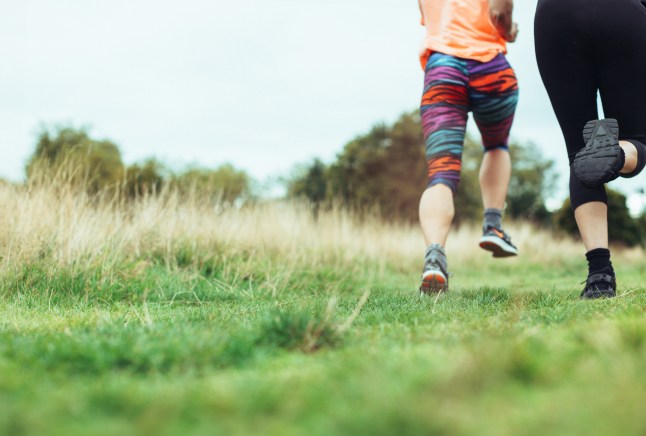
That was five years ago and I’ve since completed 125 parkruns to date – totaling 625 kms! I hope there will be many more to come. Over time, I even whittled my personal best time down to 31 minutes.
I’ve always seized on any inspiring role models who live with ulcerative colitis. I felt I wanted to spread the word about my positive experiences, so I ordered a running shirt from the charity, Crohn’s & Colitis UK.
But, it was a couple of years before I plucked up the courage to don my Crohn’s & Colitis UK running shirt – and I could not believe how many people approached me when I did. Some were sufferers themselves, while others had relatives or children with IBD.
As for the young woman with Crohn’s who approached me for a selfie, we finished the run within seconds of each other, sharing a hug of solidarity as well as a photo. I’ve never seen her again, but one thing she said stayed with me: ‘parkrun is my happy place.’
More Trending
That’s true for me too. Every time I take part, I finish with a sprint.
Parkrun is not a race, but it always feels like a win. Buoyed by the cheers of the volunteer marshals and the encouragement of fellow runners, it’s a victory for me.
Get the rest you deserve
It’s also a resounding defeat to the ulcerative colitis, which I won’t allow to take over my life.
Do you have a story you’d like to share? Get in touch by emailing Ross.Mccafferty@metro.co.uk.
Share your views in the comments below.
MORE: Pet turkey accompanies owner to 5km Parkrun
MORE: As a GP I recommend one unconventional treatment for joint pain














